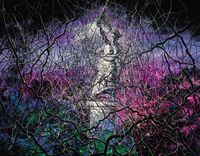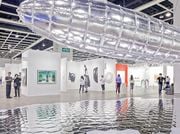In the beginning of his artistic career in the late 80's, Zeng Fanzhi painted apocalyptic, expressionist images, thus manipulating modernist compositional effects to intensify his sinister version of reality. His representational work reveals the place of the unconscious and aberrant in the construction of experience. The over-sized, clenched hands of his subjects are almost more remarkable than their stereotyped faces and wide-open eyes. Zeng Fanzhi's art simulates the fatigue of the contemporary experience: the rush to acquire and consume to the point of alienation and detachment. Working in idiosyncratic ways, he reminds us how effective art can be when it collapses these various experiences. He traces the eruption of the corporeal into the optical sedition of visual art.
Read MoreZeng Fanzhi's notorious mask series conducted in the mid 90's marks a turn in his aesthetics. All the figures in the series wear white masks fused closely with the facial features. The masks nevertheless possess a peculiar, haunting power. His figures look anxious or fearful, as if they are victims of their own roles. Through the mask motif, Zeng Fanzhi expresses suspended reality. The mood of his work is subtle unsettlement: it often suggests some past violence, recent or old, from which we can unravel clues—but never completely understand. His paintings are much more than sardonically recycled imagery. Zeng Fanzhi delivers an art that feels new, not in its premises but in its refined vitality. His late paintings signify a shift in his focus from a formal concern with the representation of existential unsettlement to an interest in how we imagine ourselves interacting with nature. Still, in his newly developed landscape paintings, there is a notion of permanent escape—an attempt to inhabit the uninhabitable. These images are expressively abstract. Rendered in cool shades of pink, black and blue, they represent the tension of failed community and human loneliness. Within these large-scale images there is a notion of fragility and vulnerability; like an attempt to create a terrain of uncertainty that inhabits both characters and landscape depicted. The grand scale of the paintings lends them a certain suggestive and sublime appearance. When viewed, the paintings constantly seem to evolve and create new particular impressions. The images reflect a social reality that is made up of multiple signifying systems of which the landscape is just one.
Zeng Fanzhi was born in 1964 in Wuhan province and studied oil painting at the Wuhan Art Academy. Today he lives and works in Beijing. Zeng Fanzhi has exhibited widely at acclaimed institutions such as the Shanghai Art Museum, National Art Museum (Beijing), Kunst Museum Bonn, Kunstmuseum Bern, Santa Monica Art Centre, (Barcelona), and Art Centre (Hong Kong). Recent solo exhibition including 2010 Zeng Fanzhi, Shanghai Rockbund Art Museum, Shanghai(2010); Zeng Fanzhi, Acquavella Gallery, New York (2009); Tai Ping You Xiang-Zeng Fanzhi solo exhibition, ShanghART Beijing(2008); Zeng Fanzhi, Idealism, National Art Museum, Singapore(2007) etc.
Text courtesy ShanghART.



